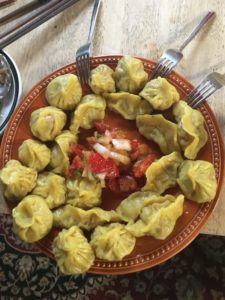What I Learned From Three Years of Volunteering By Sarah Poole
I started my service journey more than three years ago, when I decided to join the Peace Corps with my partner. We accepted positions in the Nepal Food Security program, where we practiced sustainable agriculture with community members, encouraged folks to eat more nutritious meals, built improved cook stoves, and educated people on menstrual hygiene and gender equality. An experience of a lifetime that taught me about a world much different from where I grew up and what I knew in Montana. I think it is only fair and honest to say that I learned so much more from the people I surrounded myself with in Nepal than I think I ever taught anyone. I believe this is what service-learning does for a person- to be more open to understanding differences and becoming more mindful of your impact on a place or person, as well as valuing the small differences you can make as an individual. Volunteering is empowering.

After finishing my Peace Corps service, I wanted to continue working for at least another year on a food security project. Food justice was a movement I felt drawn to from volunteering on farms, at a soup kitchen, and working as a Baker for many years. Caring about food systems and, let’s say, food in general, was the connecting thread that brought me to serve with MTCC VISTA at the University of Montana Food Pantry. It was one more step in my journey to understanding peoples’ relationship with food better and the harmful effects of food scarcity.
Working at a college food pantry has taught me so much about the impact food insecurity has on college students, the pursuit of becoming an educated person, and the struggle to rise out of poverty in the United States. Food insecurity is still a significant issue of poverty around the world and in America. Establishing a food pantry at a school or college is only one solution to addressing food insecurity. Hunger can and often does prevent many people from gaining an education and rising out of poverty, leading many to experience the short and long term physical health effects and mental stress of not having enough to eat.
Now that the Pantry is closed because of Covid-19, we are still raising money, purchasing a variety of healthy food, and making emergency meal bags for folks to take home. The generosity I have seen in the past couple of months from people volunteering their time or making monetary donations to local food banks and pantries is genuinely inspiring. One silver lining that came out of this pandemic, I believe, was highlighting our broken food system, the harmful effects of food waste in our country, and how we can redistribute these valuable resources to people in need. In the past three years, I have found myself continuously inspired by the fantastic work of fellow volunteers, coworkers, and community members. I feel privileged and grateful for the opportunity to explore my interests, understand my values and perspectives better, and find community. Volunteering has taught me the importance of building sustainable systems and deeper connections with people and places. It has led me to where I am now, in graduate school, pursuing a Masters in Social Work and doing work I want to be doing.
 Blog
Blog